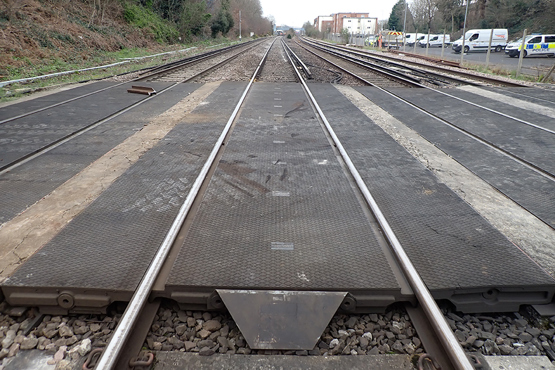The RAIB investigation found that the redundant rail had inadvertently been left in a dangerous position following maintenance work carried out over the preceding weekend. A lack of supervision and an ineffective inspection process meant the hazard was not identified before the railway was reopened for normal operations. Specifically, the absence of a designated supervisor overseeing the work and inadequate briefing of the track handback engineer contributed to the failure to detect the misplaced rail.
The report highlighted shortcomings in the planning and execution of the maintenance work, which failed to adequately manage the risk of material being left on the track. It also pointed to deficiencies in the inspection process, which lacked clear guidance on which areas needed to be checked. Furthermore, the existing railway rules and standards do not clearly define the responsibilities required for safely managing work at complex sites, leaving gaps in accountability.

A passenger train derailed near Walton-on-Thames in Surrey after striking a section of redundant rail left on the track, according to a report released today by the Rail Accident Investigation Branch (RAIB). The incident, which occurred in the early hours of March 4 2024, saw the train travelling at approximately 85 mph when it collided with the misplaced rail, leading to the derailment of the front coach. The train eventually came to a halt around 500 metres beyond the point of impact.
The RAIB investigation found that the redundant rail had inadvertently been left in a dangerous position following maintenance work carried out over the preceding weekend. A lack of supervision and an ineffective inspection process meant the hazard was not identified before the railway was reopened for normal operations. Specifically, the absence of a designated supervisor overseeing the work and inadequate briefing of the track handback engineer contributed to the failure to detect the misplaced rail.
The report highlighted shortcomings in the planning and execution of the maintenance work, which failed to adequately manage the risk of material being left on the track. It also pointed to deficiencies in the inspection process, which lacked clear guidance on which areas needed to be checked. Furthermore, the existing railway rules and standards do not clearly define the responsibilities required for safely managing work at complex sites, leaving gaps in accountability.
In response to these findings, the RAIB has made two formal recommendations. The first, directed at Colas Rail in consultation with Network Rail, calls for a review of procedures concerning the collection of redundant material following maintenance work. The second recommendation urges Network Rail, alongside the Rail Safety and Standards Board, to reassess regulations regarding task coordination and supervision at complex worksites and to establish a more structured process for confirming the safety of the railway before reopening.
Two additional learning points were also raised. One emphasises the necessity of providing adequate lighting at work sites to facilitate thorough inspections, while the other highlights the importance of ensuring outdated guidance materials are removed from resource libraries when new standards are introduced.
Chief Inspector of Rail Accidents, Andrew Hall, underscored the gravity of the issue, drawing attention to previous incidents in which objects left on the track had caused damage and disruption. He referenced a similar event in 2018 that led to urgent safety advice being issued to Network Rail, yet subsequent accidents—including this latest derailment—demonstrate that risks remain inadequately managed. Hall warned that the consequences could have been far worse had the train veered off course and collided with other trains or objects.
Hall stressed that nighttime maintenance work presents a particular challenge in ensuring tracks are safe before services resume. He described this latest accident as a stark reminder of the dangers posed by objects left on the line after engineering work and reiterated the need for stricter oversight to prevent such incidents in the future.
Login to continue reading
Or register with RAIL to keep up-to-date with the latest news, insight and opinion.


















Login to comment
Comments
No comments have been made yet.